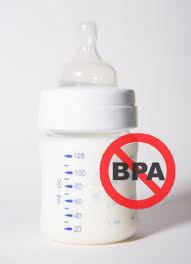 Could drinking from a plastic container lower a man’s sperm count? Sorry to be the bearer of bad news but according to a just-released study reported by USA Today, “men with higher levels of BPA, or bisphenol A, were two to four times more likely than others to have problems with sperm quality and quantity.” This comes just two months after the California State Senate did away with plans to ban the chemical in products geared toward children.
Could drinking from a plastic container lower a man’s sperm count? Sorry to be the bearer of bad news but according to a just-released study reported by USA Today, “men with higher levels of BPA, or bisphenol A, were two to four times more likely than others to have problems with sperm quality and quantity.” This comes just two months after the California State Senate did away with plans to ban the chemical in products geared toward children.
BPA? Most Americans have never even heard of it. But it’s used in plastic drink containers and many other forms of consumer packaging. According to the Center for Disease Control, there’s a 95% chance that detectable levels are sitting in your body. Some studies say it also causes lots of fun things like Diabetes, early puberty and even Down Syndrome.
Just over a year ago, the California State Assembly and Senate voted to ban BPA in baby bottles, sippy cups and infant formula packaging, following the lead of seven states (CT, MD, MA, MN, VT, WI, and WA) and 5 countries (Canada, France, Denmark, Australia and New Zealand) that already have laws limiting BPA in items used by small children. Canada bans it outright.
But fast forward a year and the state’s Senate – which had to vote on the measure again due to some procedural requirement - rejected it by one vote. Two Senators who previously voted for it abstained due to medical reasons.
So, what happened? Well it probably comes as no surprise that the multi-billion dollar pharmaceutical and chemical industries went all out to defeat the bill.
According to a piece in Food Quality News…
Politicians, as well as health and environmental activists in favour of outlawing the substance condemned the outcome – accusing the chemical and pharmaceutical industries of waging "an expensive and shamefully deceptive lobbying campaign".
Sen Pavley said industry lobbyists had told lawmakers that food production plants... would close even though such facilities do not produce any baby food or baby products... Industry representatives also allegedly sent direct mail shots claiming that a BPA ban would be too costly for lower-income families and deprive consumers of access to canned goods, said the senator, adding she believed that all the claims were untrue.
The piece also said that the Trade association the American Chemistry Council (ACC) welcomed the vote, saying that decisions on such scientific issues as the safety of BPA should be made by regulatory authorities.
"We agree with legislators in California who stated that chemical issues of this type are best addressed by the state’s own Green Chemistry Initiate and by the federal government’s regulatory authorities.”
So score one for the lobbyists this time around. Next time, I hope the influence of money will not overpower health and safety.